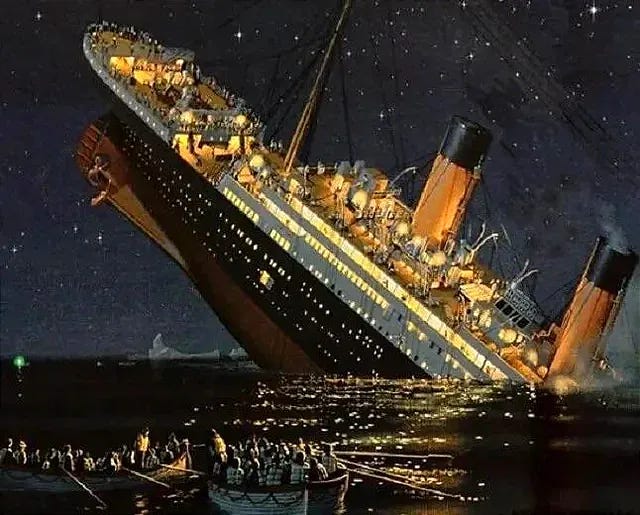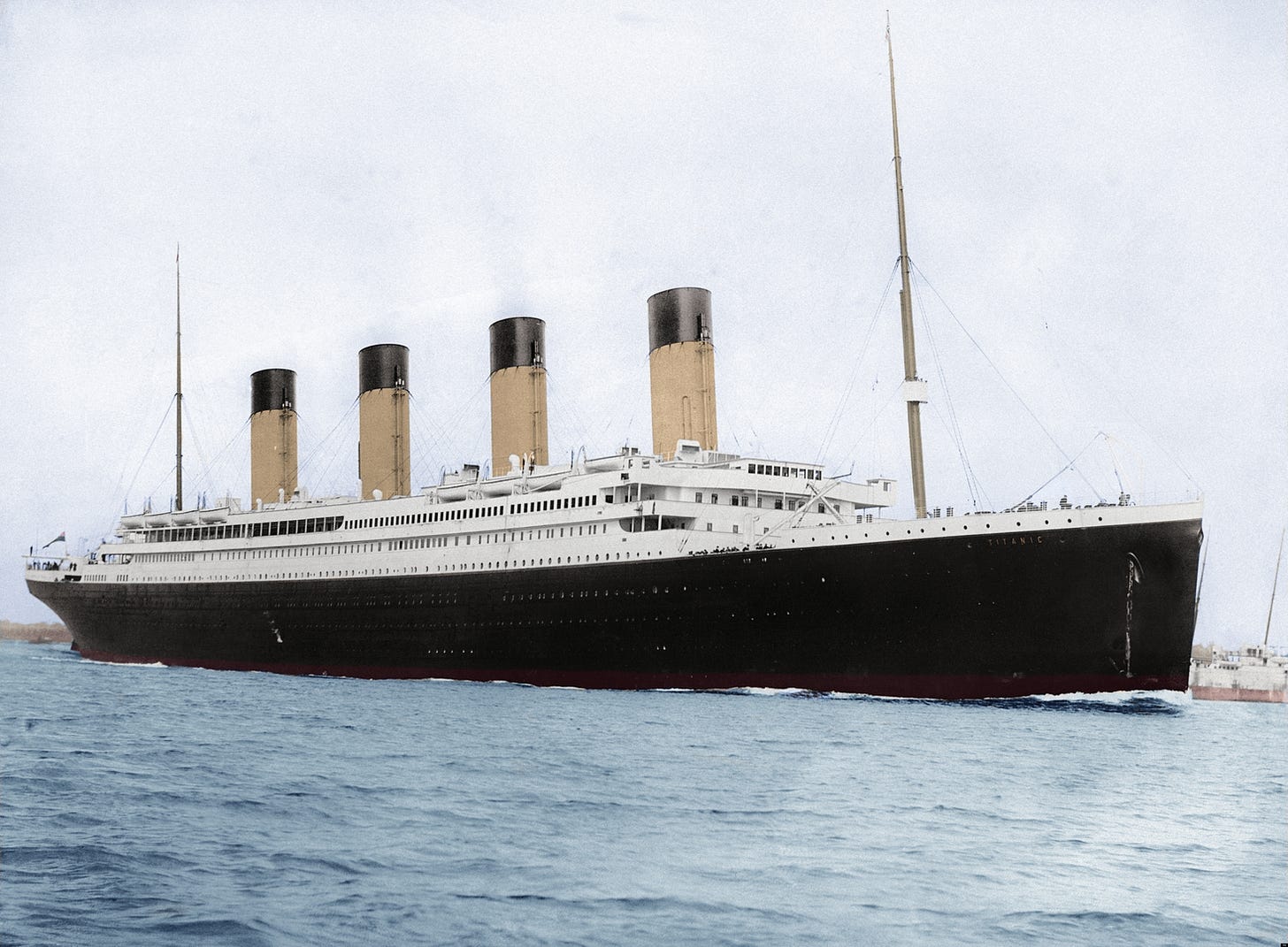Why the Captain Goes Down with the Ship
A Titanic tale of heroism, and what it can teach you about eternity.
The cold Atlantic wind howled through the broken railings of the RMS Titanic.
Below deck, steam hissed and rivets groaned. Above, men shouted for order as lifeboats creaked down into the icy black water. And somewhere near the bridge, as chaos reigned around him, one man stood still.
With a quiet, unshakeable calm, Captain Edward Smith gave a final glance over the ship he had been charged to protect. Having labored to maintain order and direct the evacuation, there was nothing more for him to do. All that remained was to await the sea’s embrace…
Today, most people remember Smith as a dignified figure — the captain who went down with his ship. But few stop to ask why he did so, or what it truly meant.
For in an age that considers honor to be little more than a relic of outdated culture and custom, Smith’s decision can seem irrational, even futile. But such a perspective misses the point entirely — for Smith’s final act wasn’t about sentiment or tradition, but about affirming eternal truths in the moment they matter most.
Today, we explore the significance of “going down with the ship” and what Captain Smith’s example reveals not only about the nature of virtue, but of truth itself. Keep reading to learn more about Victorian chivalry, noblesse oblige, and what it really means to protect those who are entrusted to your command…
But first — last week I had the privilege of being interviewed on the Becoming Noble Podcast.
Johann Kurtz and I discussed the Medici family’s rise to dominance, and how they combined faith, art, and power to change the course of history. To explore what you can learn from their example, click below to listen to the full conversation 👇
The Man Before the Myth
By the spring of 1912, Captain Edward Smith was the most trusted man in the White Star Line.
Over decades of service, he had built a reputation for composure, competence, and quiet strength. He had ferried royalty, tycoons, and heads of state across the Atlantic — earning the nickname “the Millionaire’s Captain” for the luxury clientele who sought his command.
The Titanic was to be his final voyage. At 62, Smith was ready to retire. But the company wanted to honor his career with a symbolic gesture: he would captain the greatest passenger liner ever built, guiding it safely to New York before taking his leave.
By all accounts, he had earned it. Yet beneath the honors and accolades, Smith held to a code of leadership forged in an older world — a world shaped by discipline, restraint, and moral responsibility.
As captain, Smith understood that he wasn’t just commanding a ship. Rather, he was shouldering a sacred trust…
The Final Voyage
Smith’s understanding of his role was shaped by a worldview that saw leadership not as a privilege, but as a burden.
He believed in the Victorian ideal of noblesse oblige — the idea that those with power are bound to use it in the service of those without. For a ship’s captain, that meant placing others before yourself, especially when it mattered most.
When Titanic struck the iceberg just before midnight on April 14, Smith acted immediately. He assessed the damage, briefed his officers, and began organizing the evacuation. But he didn’t retreat into private rooms or delegate the task from afar. He remained on deck, moving between lifeboats, urging calm, and helping passengers to safety.
Survivors remembered him distributing lifebelts, assisting women and children into boats, and personally ordering hesitant crewmen back to their posts. His voice remained calm. His presence steadied others.
To abandon ship would have meant admitting there was no one left to protect — that his duty had ended. But for Smith, that moment never came.
Unwilling to betray the code that had guided his entire life, he made peace with his fate, and resolved to spend his final moments as a testament to something eternal…
The Eternal Standard
I saw Captain Smith on the bridge. My eyes seemingly clung to him. The deck from which I had leapt was immersed. The water had risen slowly and was now to the floor of the bridge. Then it was to Captain Smith’s waist. I saw him no more. He died a hero.
-Robert Williams Daniel, Titanic survivor
Often, the modern reaction to Smith’s story is to attribute his sacrifice to a Victorian-era ideal of chivalry. Yet, “the captain goes down with the ship” is a phrase that both predates and outlives his example — and with good reason.
The reason the captain goes down with the ship is because in doing so, he affirms that which is eternal. It is also why failure to do so is especially repugnant — and punishable by law still to this day.
For a captain to abandon ship before all passengers have been evacuated is an abdication of duty, as a captain’s duty is none other than to ensure the safe passage of those under his care. But it is also a betrayal — not just of trust, but of morality itself.
To abandon ship is to say with one’s actions that the virtues of courage, responsibility, and sacrifice don’t actually matter in the end. It is to say that they were only ever ideals, not real truths that can withstand the crucible of trial. In that sense, it is not just a denial of virtue — but a denial of the very God who ordained it.
In choosing to remain with the Titanic as she sank, Captain Smith made his last moments a testament to eternal truth. He stood bravely for all to see that even as the unfolding disaster changed everything, it also changed nothing — for the timeless principles of goodness, truth, and beauty still remained.
Smith’s death was not merely a heroic gesture, but a declaration that truth exists and virtue endures. It was, in the words of his compatriot, an affirmation that:
Love alters not with his brief hours and weeks,
But bears it out even to the edge of doom
-Shakespeare, Sonnet 116
Takeaways
1) Be the Calm in the Chaos
When disaster strikes, most people panic. Captain Smith did not. Even as hysteria spread, he moved steadily between lifeboats, speaking calmly and acting decisively.
Leadership in crisis doesn’t begin with bold speeches — it begins with presence. Be the one others look to when the world begins to shake.
2) Testify to the Eternal
Smith’s choice to stay with Titanic wasn’t just for show. By refusing to abandon ship, he affirmed that courage, responsibility, and sacrifice are not circumstantial. They are enduring truths, meant to be upheld especially when tested.
To live — and die — by these truths is to point not just to virtue, but to the God who ordained it.
3) Go Down with the Ship
The role of a leader is to safeguard the lives entrusted to him — not to save himself when the cost becomes high. Smith fulfilled that charge to the end, since saw the captain’s burden not as conditional, but sacred.
When all seems lost, don’t run. Stay at your post and go down with the ship — for in doing so, you rise toward something greater.
Want to dive deeper?
For an in-depth discussion on the sinking of the Titanic (113 years ago today), join me and James this Thursday at 9am ET as we go live on X.
Visit my X account at 9am to access the livestream — once it ends, the stream will be added to our Members-Only Video Archive for you to catch the replay.
Also this Thursday, our premium subscribers will get a deep dive article exploring the life of the richest passenger on the Titanic — a man who embodied the excess of the American Gilded Age, but also the nobility it aspired to...
If you’re not already a premium subscriber, please consider joining below:
Ad finem fidelis,
-Evan










Noblesse oblige ...
Thank you this article, it’s given me an insight on how to face death.